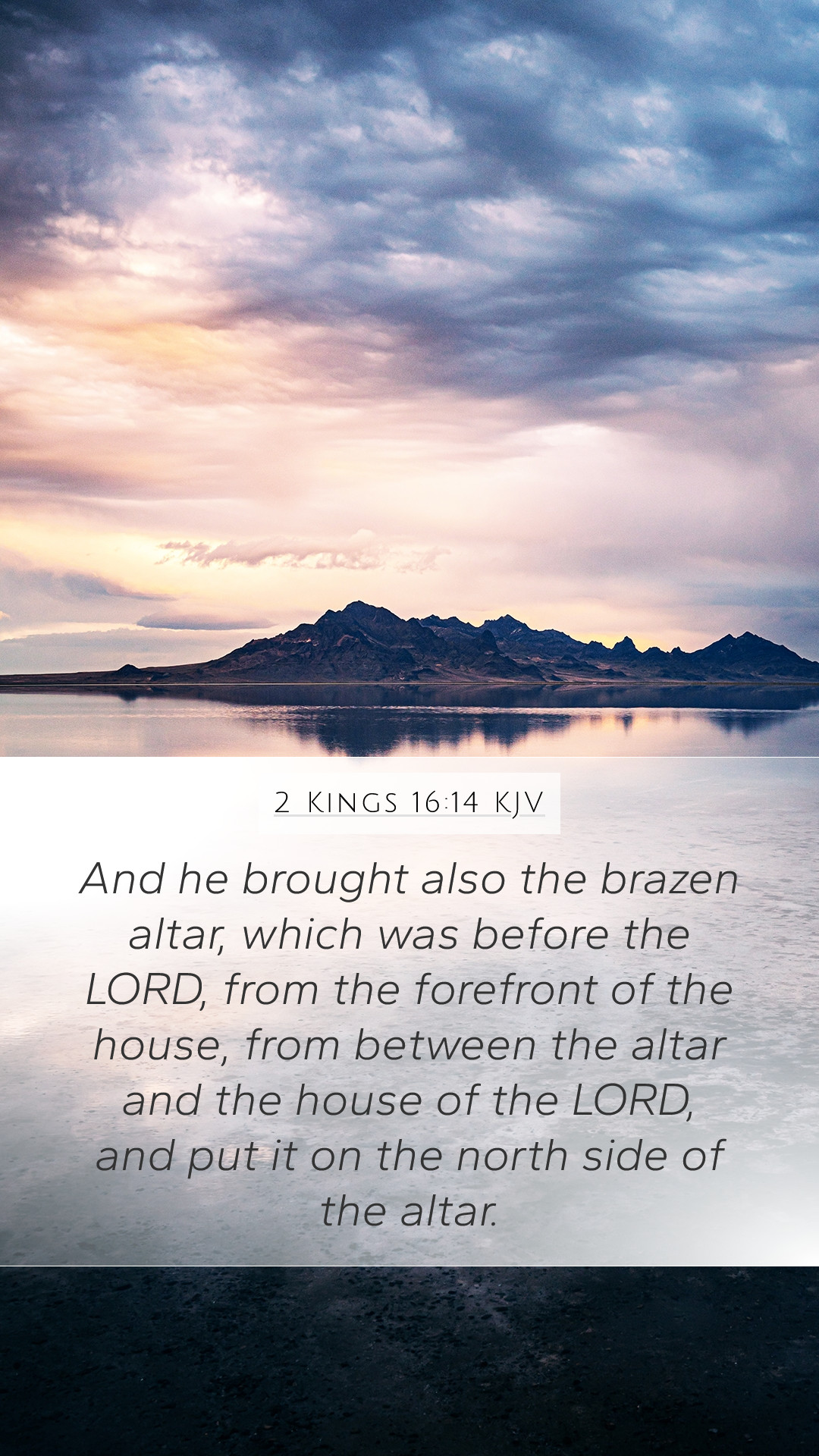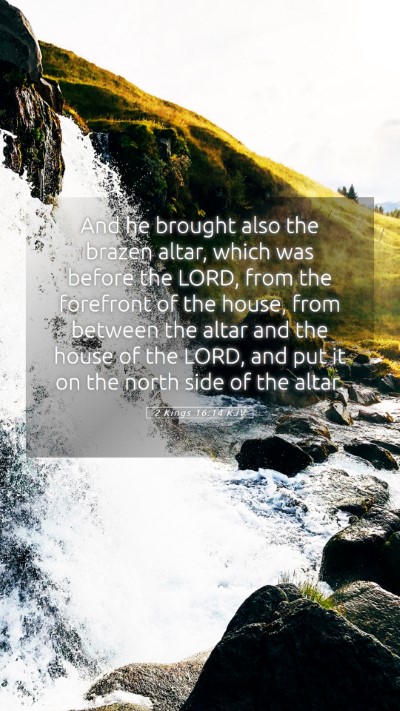Old Testament
Genesis Exodus Leviticus Numbers Deuteronomy Joshua Judges Ruth 1 Samuel 2 Samuel 1 Kings 2 Kings 1 Chronicles 2 Chronicles Ezra Nehemiah Esther Job Psalms Proverbs Ecclesiastes Song of Solomon Isaiah Jeremiah Lamentations Ezekiel Daniel Hosea Joel Amos Obadiah Jonah Micah Nahum Habakkuk Zephaniah Haggai Zechariah Malachi2 Kings 16:14 Meaning
What is the meaning of 2 Kings 16:14?
And he brought also the brazen altar, which was before the LORD, from the forefront of the house, from between the altar and the house of the LORD, and put it on the north side of the altar.
2 Kings 16:14 Bible Verse Meaning
Understanding 2 Kings 16:14
Bible Verse: 2 Kings 16:14 (KJV) - "And he brought also the brasen altar, which was before the Lord, from the forefront of the house, from between the altar and the house of the Lord, and put it on the north side of the altar."
Introduction
The verse in 2 Kings 16:14 highlights a significant moment in the reign of King Ahaz of Judah. The actions taken here reflect a pivotal shift in the worship practices of the people of Judah, signaling a departure from the prescribed worship of Yahweh towards a more syncretistic approach influenced by foreign customs.
Context and Background
To fully understand this verse, it is necessary to consider the historical and spiritual context surrounding King Ahaz’s reign. Ahaz was known for his idolatrous practices and his alignment with foreign powers, often leading Judah away from the faithfulness to God.
Historical Context
During Ahaz's reign, the kingdom of Judah faced external threats, particularly from Israel and Syria. To secure his throne, Ahaz sought alliances with Assyria, which introduced various pagan practices into Judah. This context is crucial for understanding the significance of relocating the brazen altar.
Theological Implications
This verse illustrates the theological implications of Ahaz's actions—altering the established forms of worship instituted by God. The movement of the brazen altar can be seen as an affront to God's holiness and a manipulation of worship, indicative of a greater trend of disobedience among the people of Judah.
Commentary Insights
- Matthew Henry's Commentary: Henry emphasizes that the move of the brazen altar represented a departure from true worship. Instead of adhering to God's commandments, Ahaz chose to blend the altar's use with pagan influences, showcasing a lack of reverence for God's established order.
- Albert Barnes' Notes: Barnes points out that this act symbolized a serious corruption of genuine worship. The brazen altar, a symbol of God's covenantal presence, being placed in a questionable position signifies the failure of Ahaz to honor God's commands and serves as a warning against syncretism in worship practices.
- Adam Clarke's Commentary: Clarke elaborates on the significance of the brazen altar in the worship system of Israel, underscoring how its relocation was not merely a physical act but also a spiritual one representing Ahaz's overall rebellion against God.
Meaning and Application
The essence of this verse can be gleaned from the way it illustrates the dangers of prioritizing political expediency over spiritual fidelity. For contemporary believers, this serves as a compelling cautionary tale regarding the significance of maintaining a clear and dedicated worship of God, free from external influences that might compromise one's faith.
Lessons for Today
- Prioritizing Worship: The importance of maintaining a worship ethos that aligns with Scripture, resisting the temptations of modern syncretism.
- Understanding God’s Commands: Recognizing the weight of God’s commands and the heart of true worship contrasted with cultural adaptations.
- Spiritual Vigilance: Encouraging believers to remain vigilant against influences that may lead them away from the truth of the Word.
Related Bible Cross References
- 2 Chronicles 28:24: Details how Ahaz stripped the temple and the treasures for his alliances.
- Isaiah 7:1-2: Describes the political turmoil during Ahaz's rule that led to his fear and subsequent decisions.
- Exodus 27:1-8: Gives the original specifications for the brazen altar, underscoring its importance in worship.
- Jeremiah 7:31: Warns against the practices of idolatry that had seeped into Judah's worship practices.
Conclusion
In summary, 2 Kings 16:14 exposes the spiritual decline during King Ahaz’s reign as he moved the brazen altar in a misguided attempt to adapt worship to his political strategies. From a biblical exegesis perspective, this passage serves to remind us of the importance of fidelity to God's established forms of worship and the dangers of compromising our beliefs in the face of worldly pressures. Embedding these lessons into our Bible study insights, we can help facilitate richer discussions in Bible study groups and enhance our understanding of Scripture as we delve deeper into the meanings of Bible verses.


